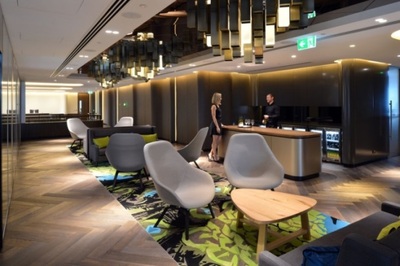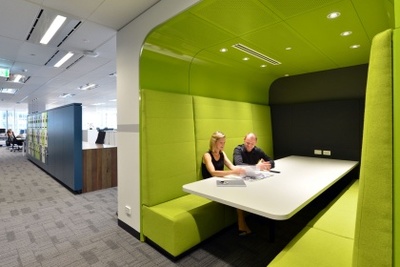Reshaping office space for connectivity, flexibility and sustainability
Wednesday, 21 August, 2013
The traditional office space is being reshaped, with the intention of combating rising rental costs and providing employees with more flexibility, all at the same time. According to FDC Construction & Fitout Managing Director Ben Cottle, the corporate industry is embracing open-plan spaces, complete with multiple connectivity points that allow employees to work from anywhere, at any time.
Physiotherapist and Managing Director of Injury Treatment Jeremy Keane explained that the flexibility and comfort of these spaces - giving individuals the option to choose between, for example, working at a traditional desk, in a ‘cafe’ setting or from the comfort of a lounge - brings benefits such as an increase in employee morale, productivity and engagement.
“As a result of these new offices, we are seeing an emergence of a new generation of corporate culture that focuses on team outcomes over hierarchy or individual achievement,” said Keane. “This has a positive impact on the office atmosphere, increases leader access, clears internal communication channels and promotes equity.”


The new style of workplace can be seen in the Sydney office of CBRE at 363 George Street - claimed to be the first CBRE office in Australia to move to a new way of working and the second of 21 CBRE offices worldwide to follow an activity-based workplace (ABW) model. The fit-out was managed by FDC.
CBRE President and CEO, Australia & New Zealand, Tom Southern noted that “a tailored version of the ABW model, designed to suit our specific needs”, was applied to the office. He said the company selected a design which has “a modern, progressive feel that truly reflects our business and our culture, as well as providing an interesting take on the traditional corporate space”.
The office features open-plan spaces, lounge areas, conferencing pods and traditional private desks. CBRE’s NSW Managing Director, James Patterson, explained: “During the course of a day, our people undertake many different activities that require different work settings with various levels of collaboration. The new office incorporates a variety of work spaces for staff to choose, including workstations, think tanks, quiet rooms, meeting rooms, a CBRE Bar (known as the CBar) for client entertaining, and a substantial staff breakout area.”
CBRE’s Head of Sustainability for Pacific, Rebecca Pearce, said the workplace was designed using holistic sustainability principles and the office is “aiming to exceed the 5-star NABERS Energy Tenancy rating achieved in several other CBRE offices”. The lighting now features occupancy sensors and new IT equipment has been set up “for optimal energy savings both inside and outside the office”. The fit-out has been “planned to optimise the indoor environmental quality (IEQ)” and “all materials, furniture and equipment have been selected to minimise volatile organic compounds (VOCs)”.
The business is also targeting a reduction in carbon emissions from several operating practices, including travel, paper and waste. For example, the central city location provides access to public transport, while cycling facilities are located in the office’s basement.
From April 2012 to April 2013, energy consumption decreased by 61% and there was a similarly reduction in paper usage. Southern says the new workspace has provided the opportunity to “increase collaboration, enable greater flexibility and instigate change in the way our people work”.
Rethinking IT sustainability
As businesses rethink how they manage their IT infrastructure, embedding sustainability into...
Emissions as data: the challenge of reporting on an invisible metric
The challenge many businesses face is quite apparent: how does one measure emissions? AVEVA says...
The 3 key risks directors need to manage amid climate reporting uncertainty
2025 will be a marker year for climate reporting, and boards should devote attention to three key...










